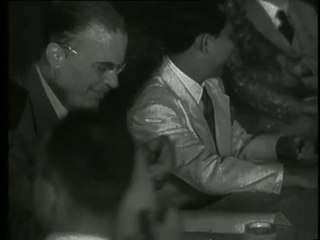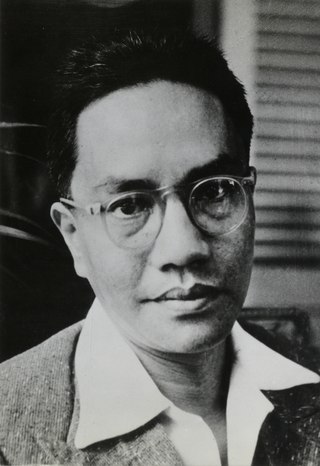Related Research Articles

The Indonesian National Party was the name used by several nationalist political parties in Indonesia from 1927 until 1973. The first PNI was established by future President Sukarno. After independence, the new PNI supplied a number of prime ministers, and participated in the majority of cabinets in the 1950s and 1960s. The party was fused into the Indonesian Democratic Party in 1973. In the years following the reforms of the late 1990s, a number of parties claiming to be the continuation of previous PNIs stood in elections, but gained only a handful of seats.

Sutan Sjahrir was an Indonesian politician, and revolutionary independence leader, who served as the first Prime Minister of Indonesia, from 1945 until 1947. Previously, he was a key Indonesian nationalist organizer in the 1930s and 1940s. Unlike some of his colleagues, he did not support the Japanese during the Japanese occupation and fought in the resistance against them. He was considered to be an idealist and an intellectual.

The Linggardjati Agreement was a political accord concluded on 15 November 1946 by the Dutch administration and the unilaterally declared Republic of Indonesia in the village of Linggarjati, Kuningan Regency, near Cirebon in which the Dutch recognised the republic as exercising de facto authority in Java, Madura and Sumatra.

Amir Sjarifuddin Harahap was an Indonesian politician and journalist who served as the second prime minister of Indonesia from 1947 until 1948. A major leader of the left-wing during the Indonesian National Revolution, he previously served as Minister of Information from 1945 until 1946 and Minister of Defense from 1945 until 1948. Amir was born into the Sumatran aristocracy, and was educated at Leiden University. At Leiden, he became a member of the board of the Gymnasium student association in Haarlem, and was involved in the Batak student organization Jong Batak. He returned to Indonesia due to family troubles, but continued his education at the Rechts Hogeschool in Batavia.

The Prime Minister of the Republic of Indonesia was a political office in Indonesia which existed from 1945 until 1966. During this period, the prime minister was in charge of the Cabinet of Indonesia, one of the three branches of government along with the People's Representative Council and the president. Following his 1959 decree, President Sukarno assumed the role and powers of prime minister until his resignation in 1966.

This is the timeline of Indonesian National Revolution.

The Madiun Affair, known locally as the Communist Party of Indonesia rebellion of 1948, was an armed conflict between the government of the self-proclaimed Republic of Indonesia and the left-wing opposition group Front Demokrasi Rakyat during the Indonesian National Revolution. The conflict began on September 18, 1948, in Madiun, East Java, and ended three months later when most FDR leaders and members were detained and executed by TNI forces.

The Central Indonesian National Committee, also known as the Central National Committee, was a body appointed to assist the president of the newly independent Indonesia. Originally purely advisory, it later gained assumed legislative functions. The Working Committee of the KNIP became part of the People's Representative Council when Indonesia became a unitary state in 1950.

The Second Sjahrir Cabinet was the third Indonesian cabinet and the second formed by Sutan Sjahrir. It served from March to June 1946.

The Third Sjahrir Cabinet was the fourth Indonesian cabinet. It served from October 1946 to June 1947, when it fell due to disagreements related to the implementation of the Linggadjati Agreement and subsequent negotiations with the Dutch.

The First Amir Sjarifuddin Cabinet was the fifth Indonesian cabinet and was in office from 3 July to 11 November 1947.
The Asian Socialist Conference (ASC) was an organisation of socialist political parties in Asia that existed between 1953 and 1965. It was established in an effort to build a Pan-Asian multinational socialist organization, clearly independent from earlier European colonial centres, yet free from the new superpowers of the Cold War.
The Socialist Party of Indonesia was a political party in Indonesia. It was founded at a meeting in Jogjakarta on 13 November 1945. The Defence Minister Amir Sjarifuddin was the chairman of the party. Parsi was largely made up by Amir Sjarifuddin's former colleagues from the wartime resistance struggle in East Java. Some of them originated in Gerindo, a leftwing, nationalist and pro-Sukarno group active before the war. There were also some persons, like Abdulmadjid, Moewaladi and Tamzil, who had lived in the Netherlands during the war, and taken part in the anti-fascist resistance struggle there. The primary objective of Parsi was the independence of Indonesia from colonial rule, which was to be followed by the construction of a socialist society.
The Socialist People's Party was a political party in Indonesia. It was founded in Djakarta in 1945. Sutan Sjahrir was the chairman of the party. In December 1945, at a meeting in Cheribon, the party merged with the Socialist Party of Indonesia, forming the Socialist Party with Sjahrir as chairman.
The Labour Party of Indonesia was a political party in Indonesia.
Ibnu Parna was an Indonesian communist politician and leader of the Acoma Party, and trade unionist.
Vice Presidential Edict No. X was an edict issued by Indonesian Vice-president Mohammad Hatta on 16 October 1945 which gave the Central Indonesian National Committee (KNIP), initially a purely advisory body, the authority to become the legislative body of the government.
The All-Indonesian Federation of Workers'Organisations was the largest trade union federation in Indonesia. Founded during the period of the country's independence in the late 1940s, the federation grew rapidly in the 1950s. Initially formed with loose connections to the Communist Party of Indonesia (PKI) and with members from other parties, over time the PKI became dominant in the organisation. With the introduction of President Sukaro's guided democracy in the late 1950s, SOBSI was formally recognised and given a place in the national decision-making structures. In the 1960s, SOBSI came into conflict with the Army, whose officers controlled the country's state enterprises. Following the 1965 coup that subsequently produced Suharto's New Order regime, SOBSI was declared illegal, its members killed and imprisoned and most of the leadership executed.

Wikana was an Indonesian minister and independence leader. He was one of the youths who forced Sukarno and Hatta to declare independence immediately after the surrender of the Japanese. He was the first Indonesian Minister of Youth and Sport. He was a member of the Indonesian Communist Party. Sometime after the 1965 coup d'état attempt, he was arrested and went missing, it is supposed that he was one of the assassinated in the Indonesian mass killings of 1965–66.

Pemuda Sosialis Indonesia was a youth organisation that embraced the principles of socialism to uphold the Republic of Indonesia based on popular sovereignty. Pesindo was particularly closely associated with youth leaders in 1945. The role of youth figures such as Wikana and Chaerul Saleh, Soemarsono and Krissubanu, Ibnu Parna and other figures shaped Pesindo's identity, namely a revolutionary youth organisation against colonialism and fascism.
References
- 1 2 3 Rose, Saul. Socialism in Southern Asia. London: Oxford University Press, 1959. p. 147
- 1 2 3 Rose, Saul. Socialism in Southern Asia. London: Oxford University Press, 1959. p. 148
- ↑ Rose, Saul. Socialism in Southern Asia. London: Oxford University Press, 1959. p. 149
- ↑ Rose, Saul. Socialism in Southern Asia. London: Oxford University Press, 1959. p. 150
- ↑ Rose, Saul. Socialism in Southern Asia. London: Oxford University Press, 1959. p. 152